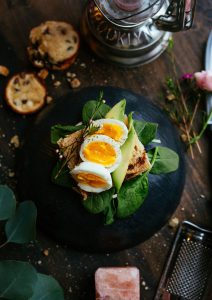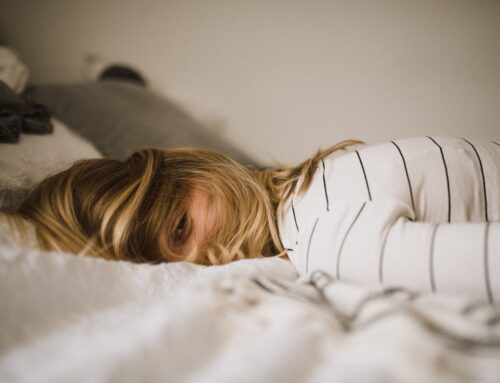It’s no surprise that sleep and nutrition impact our mental, emotional and physical wellbeing. Getting a good night’s sleep can help you better manage your anxiety and improve your mental wellbeing. Read on to learn how you can start sleeping better, consuming more anxiety-supporting foods, and self-reflect for better mental health.
Get a better night’s sleep
Anxiety is often connected with various sleeping issues like falling asleep or staying asleep throughout the night. Sleep deprivation can worse anxiety, making it a vicious cycle. Not only does sleep deprivation affect anxiety, but it makes an impact on our physical and emotional wellbeing.
To help with lowering those feelings of anxiety and excess worries that tend to creep up at bedtime, try relaxation techniques. Relaxation exercises can include deep breathing and mindfulness medication to help put your mind at ease, and in turn help with falling asleep.
 Often, staying asleep or going back to bed after waking up in the middle of the night can be a challenge. This can be related to stress and anxiety, which presents itself as a wandering mind. To sleep more soundly, establish a good night’s sleep routine. This may look different for every individual. However, a basic routine can look like this: enjoy a hot bath, put on a set of your most comfortable pyjamas, brush your teeth, and then read an easy book or listen to soft music until you start to feel sleepy. Block out 7 to 9 hours for a full night of sleep, and try to go to bed and wake up at the same time every day, including weekends!
Often, staying asleep or going back to bed after waking up in the middle of the night can be a challenge. This can be related to stress and anxiety, which presents itself as a wandering mind. To sleep more soundly, establish a good night’s sleep routine. This may look different for every individual. However, a basic routine can look like this: enjoy a hot bath, put on a set of your most comfortable pyjamas, brush your teeth, and then read an easy book or listen to soft music until you start to feel sleepy. Block out 7 to 9 hours for a full night of sleep, and try to go to bed and wake up at the same time every day, including weekends!
During the day, it may be tempting to lie in bed. But try to use your bedroom as a bedroom – a place to rest, and avoid doing work or watching TV in bed. Only climb into bed when you’re tired. Keeping this boundary helps you associate your bedroom with sleep. If you have trouble falling asleep within 15 minutes, go to another room and do a relaxing activity like reading a book.
Regular exercise will also help you sleep better. Some individuals may try to limit their physical activity to morning and afternoons, as working out too close to bedtime may keep your adrenaline going and cause you to stay awake.
Food for the mind and soul
Not only does sleep and exercise impact mood and anxiety, but so does nutrition. The foods we eat and when we eat them can impact sleep and anxiety.
A good habit that supports healthy sleep is avoiding consumption of caffeine at least 4 hours before bedtime. For many individuals, having a cut-off time of 12pm-3pm for caffeine may be beneficial. This includes black teas, coffee, chocolate and soft drinks. Caffeine acts as a stimulant which can keep you awake, and worsen anxiety and stress. Reducing or limiting caffeine can help better manage feelings of anxiety.
Some important nutrients for managing anxiety include:
- Magnesium: found in leafy greens such as spinach, Swiss chard; legumes, whole grains, nuts, seeds
- Omega-3s: found in fatty fish such as salmon, mackerel, sardines; nuts, seeds
- Vitamin D: found in egg yolks and fatty fish
- L-theanine: an amino acid found in green tea
Did you know?
Eggs not only contain B vitamins and vitamin D, but they contain an amino acid called tryptophan, which helps to create serotonin. Serotonin is a chemical neurotransmitter that helps regulate sleep, mood, memory, and brain function. Studies have shown serotonin to be effective in relieving anxiety. Tryptophan, a precursor to serotonin production can be found in dark chocolate, which can be effective in support mood. The healthiest option when choosing a dark chocolate is one that contains at least 70 percent cacao.
Self-reflecting to release anxiety
Self-reflection or introspection can spark insight into why we see ourselves and those around us the way we do. It helps us understand why we have the thoughts and feelings we do. Studies show that introspection can strengthen our emotional intelligence, making it easier to cope with life’s challenges.
A few questions you can start asking yourself are:
- How does fear show up in my life? How does it hold me back?
- What’s one of my biggest regrets? How can I get go of that?
- Am I letting situations that are out of my control stress me out?
- Am I taking care of myself physically, mentally and emotionally?
- How can I start taking better care of myself?
Aside from self-reflection, it may also help to speak with someone you trust, such as your partner, close friend, or a counsellor. Whichever road you choose, we hope you’re inspired to take on one new action today for a path to less anxiety and more calmness in your life.







Hi there. I take 5-7 mg of imovane ( sleep pill)at night. Could I take 5- htp during the day? Thank you
Hi there, thank you for your question. 5-HTP supplementation is cautioned with the use of other medications or products that may cause drowsiness and sedation, such as Imovane (Zolpiclone), due to the potential for additive effects. We recommend checking in with your healthcare practitioner or pharmacist. Some individuals may experience drowsiness when taking 5-HTP, and must exercise caution if operating heavy machinery, driving a motor vehicle or involved in activities requiring mental alertness. Hope this helps!